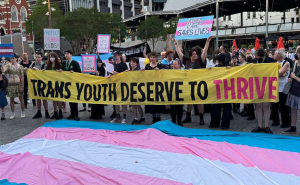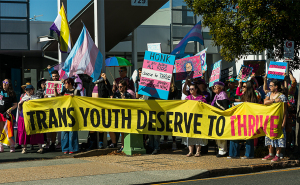
As trans rights face increasing attacks overseas, Australia’s comparatively moderate political climate provides cautious hope for 2025.
While efforts to spark a culture war over trans issues have largely fizzled in a cost-of-living and climate crisis, anti-trans campaigners remain determined to push their agenda.
Small gains for Australian trans people in 2025
People in Western Australia and NSW can look forward to having an easier time at their respective Departments of Births, Deaths and Marriages if they want to change their gender markers on their identity documents.
In 2024, legislation was passed in both states to allow trans people to correct the sex listed on their birth certificates and change their name without needing to state their case before a panel or provide proof of gender affirming surgery. These changes are expected to go through in the first half of 2025, though an exact date is unknown.
In Victoria, anti-hate speech laws set to be expanded to include gender identity, sex, sex characteristics, sexual orientation, and personal association with a person with a protected attribute. This means that speech that vilifies, incites or threatens violence against LGBTIAQ+ people and their friends and family will be considered an offence.
The proposed privatisation of the Victorian Department of Births, Deaths and Marriages was halted by a union campaign. After the Treasurer met with investors to discuss selling the Department, members of the public service organised to stop this slow but essential service being put into private hands.
Bad, transphobic news from America
The United States is facing an unprecedented but unsurprising wave of anti-transgender and anti-LGBTIAQ+ legislation. A tracker maintained by Erin In The Morning has recorded nearly 120 anti-LGBTIAQ+ bills filed across 13 states, far exceeding the 80 bills introduced in 2023. Much of this legislation targets trans and gender nonconforming people.
Texas and Missouri have filed the majority of these bills, but states like South Carolina, New Hampshire, and Wyoming are also seeing a surge. Several bills aim to strip transgender people of legal recognition, denying or even reversing gender marker changes on driver’s licences – a policy already enacted in states like Kansas, Florida, and Texas. Bathroom bans and sports bans are also a recurring theme, with proposals in Montana and Texas targeting transgender adults.
Beyond gender identity, book bans targeting LGBTIAQ+ literature, drag bans, and forced outing of students set to make life harder for LGBTIAQ+ Americans in a myriad of ways.
The Supreme Court is set to rule on a landmark case that could redefine the legal protections for transgender people, determining whether discrimination based on transgender status qualifies as sex discrimination. The decision may either stem the tide of anti-trans legislation or exacerbate an already dire situation. However, the conservative majority of the court makes the outcome of this case almost certain.
Nervous anticipation ahead of Australian election
Australia is heading to the polls in 2025, with a federal election date expected to be announced soon.
The Liberal Party, led by Opposition Leader Peter Dutton, has yet to reveal whether it will use trans people as a culture war talking point.
However, the success of anti-trans rhetoric in the USA, last year’s census question kerfuffle, Jacinta Nampijinpa Price’s vow to take on trans athletes as her next campaign, the recent reinstatement of Moira Deeming to the Victorian Liberal Party, and the ousting of Victorian Liberal Party leader John Pessuto in favour of conservative Brad Battin point to signs that Australia is not immune to the anti-trans campaigns underway in other countries.
While Pauline Hanson’s proposed amendments to the Sex Discrimination act were quashed before even being read out, she received some support from other members of the Senate.
In Queensland, the Liberal party promised to ban puberty blockers for minors in its election campaign. While no legislation has yet materialised, the proposal remains on the table.
Will trans surgeries get Medicare item numbers in 2025?
The years-long fight for gender affirming surgeries to have their own unique Medicare item numbers continues to slowly grind its way through the bureaucratic machine.
In the Medicare system, every surgery has its own name, known as its item number. This allows Medicare to know which surgeries are being performed, and set a price (the Medicare Benefit Scheme rebate) for each of them.
That is, except gender-affirming surgeries. Right now, surgeons performing these surgeries either have to state that they’re performing a related surgery, or cobble together a list of smaller procedures in order to tell Medicare and the patient what they’re planning to do. Issuing gender-affirming surgeries with their own item numbers will allow for more precise data to be collected, recognise procedures like facial feminisation surgery that are currently only available privately at huge expense, and potentially increase the rebate to make the surgeries more affordable for patients.
How to combat rising anti-trans rhetoric in 2025
While the spectre of international events continues to hang over Australia, strong local leadership and a more politically moderate climate offers a glimmer of hope for trans people in this country.
Previous efforts to bring trans issues into the culture war have not sparked here in the same way they have in other countries. However, anti-trans campaigners, emboldened by events here and overseas, will continue to try and make fetch happen.
As the authors of a recent paper argue, the anti-trans rhetoric we see today was an extension of the failed marriage equality debates of the 2000s.
Reminding people of our humanity, advocating for material changes that enable our flourishing, and keeping abreast of anti-trans tactics will help keep Australia a relatively safe place for the trans community, and the LGBTIAQ+ community more broadly.



